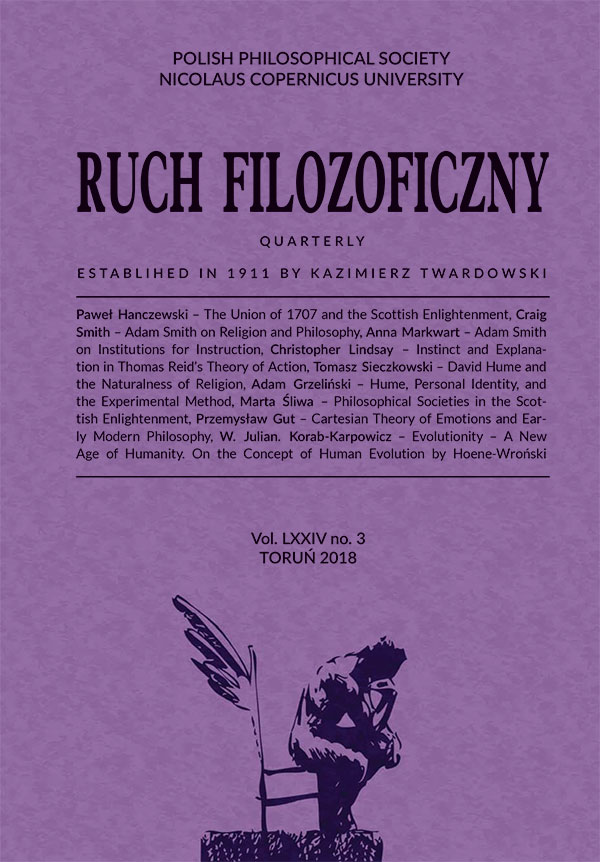Hume, Personal Identity, and the Experimental Method
DOI:
https://doi.org/10.12775/RF.2018.029Słowa kluczowe
David Hume, tożsamość osobowa, empiryzm, uczucia, oddźwięk uczuciowy, podmiot moralnyAbstrakt
Hume, tożsamość osobowa i metoda eksperymentalna
Niniejszy artykuł dotyczy związku pomiędzy Hume’owską eksplikacją tożsamości osobowej a tym, czym miałoby być „rozumowanie eksperymentalne” wprowadzone do tematyki moralnej, jak głosi podtytuł „Traktatu o naturze ludzkiej”. Opierając się na analizach roli uczuć w kreacji tożsamości człowieka, staram się bronić tezy o zasadniczo spójnym charakterze tego dzieła. Zgodnie z taką interpretacją zamysł Hume’a polega na ukazaniu wieloaspektowości pojęcia ludzkiej tożsamości, w której konstrukt autobiograficznej pamięci i rozumu uzupełniony jest o poczucie tożsamości budowane na podstawie relacji z innymi, ostatecznie zaś tożsamość człowieka znajduje swe spełnienie w jego funkcjonowaniu jako podmiotu moralnego, gdzie do głosu w pełni dochodzi jej wymiar praktyczny.
Bibliografia
Ainslie, Donald C. “Scepticism about Persons in Book II of Hume’s Treatise.” Journal of the History of Philosophy 37, no. 3 (July 1999): 469–492.
Árdal, Páll. Passion and Value in Hume’s ‘Treatise’. Edinburgh: Edinburgh University Press, 1966.
Butler, Joseph. “On Personal Identity.” In The Analogy of Religion. London: J. M. Dent & Sons, 1936.
Carlson, Asa. “There is Just One Idea of Self in Hume’s Treatise.” Hume Studies 35, no. 1–2 (November 2009): 171–184.
Chazan, Pauline. “Pride, Virtue, and Self-Hood: A Reconstruction of Hume.” Canadian Journal of Philosophy 22, no. 1 (March 1992): 45–64.
Davidson, Donald. “Hume’s Cognitive Theory of Pride.” The Journal of Philosophy 73, no. 4 (November 1976): 744–757.
Garrett, Don. Cognition and Commitment in Hume’ Philosophy. New York-Oxford: Oxford University Press, 1997.
Glathe, Alfred. Hume’s Theory of the Passions and of Morals. Berkeley-Los Angeles: University of California Press, 1950.
Grzeliński, Adam. Kategorie “podmiotu” i “przedmiotu” w Dawida Hume’a nauce o ludzkiej naturze. Toruń: Wydawnictwo Naukowe UMK, 2005.
Hume, David. “A Dissertation on the Passions.” In A Dissertation on the Passions. The Natural History of Religion, edited by Tom L. Beachamp, 3–29. Oxford: Clarendon Press, 2007.
Hume, David. A Treatise on Human Nature, edited by Ernest C. Mossner. London: Penguin Books, 1969.
Hume, David. An Enquiry Concerning Human Understanding, edited by Lewis Amherst Selby-Bigge. Oxford: Clarendon Press, 1998.
Kemp Smith, Norman. The Philosophy of David Hume. London: Macmillan, 1941.
Locke, John. “An Essay Concerning Human Understanding.” In The Works of John Locke (London: Rivington, 1824), vol. 1–2.
Mijuskovic, Ben. “Hume and Shaftesbury on the Self.” Philosophical Quarterly 21, no. 85, (October 1971): 324–336.
Norton, David Fate. «David Hume» Common-Sense Moralists, Sceptical Metaphysician. New York-Princeton: Princeton University Press, 1982.
Pyka, Marek. O uczuciach, wartościach i sympatii. David Hume, Max Scheler. Kraków: Universitas, 1999.
Robison, Wade L. “Hume on Personal Identity.” The Philosophical Quarterly 11, no. 1 (April 1962): 181–193.
Rorty, Amélie Oksenberg. “‘Pride Produces the Idea of Self’: Hume on Moral Agency.” Australasian Journal of Philosophy 68, no. 3 (September 1990): 255–269.
Roth, Robert J. “Hume and James on Personal Identity.” American Catholic Philosophical Association” 64, no. 2 (1990): 233–247.
Pobrania
Opublikowane
Jak cytować
Numer
Dział
Statystyki
Liczba wyświetleń i pobrań: 952
Liczba cytowań: 0



